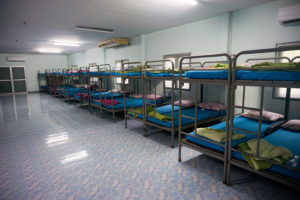One of the most basic human needs in addition to survival is to feel safe. Of course, the two go hand-in-hand. But how often in our lives do we really feel safe?
Feeling safe
There are many benefits of feeling safe and secure, with the first one being your body’s chemical makeup consists of reward hormones and you feel great. The opposite occurs if you constantly feel on guard. It is in the first scenario that you feel free to create, explore, play and use your imagination. Your capacity to interact with the world in a meaningful and effective manner is increased.
When you are constantly on hyper-vigilant and trying to protect yourself from real or imagined threats, your short and long-term quality of life will be compromised. One of the effects is that more situations in the present will resemble what you learned was unsafe in your childhood. You will be over-reacting to scenarios that really aren’t dangerous, but your brain won’t know it. Your body will feel under threat and your chemical makeup will keep you on “high-alert”. It will be harder to relax and enjoy your life.
This is documented by the ACE (adverse childhood experiences) study done in 1996. (1) A survey of challenging childhood circumstances was given to over 17,000 people and health surveys were administered. There were ten exposures.
Household dysfunction
- Substance Abuse
- Parental separation/ divorce
- Parent with mental illness
- Battered mother
- Criminal behavior
Abuse
- Physical
- Psychological
- Sexual
Neglect
- Emotional
- Physical
Only 30% of participants had a score of zero and 26% had a score of 3 or more. There were increased chances of severe health consequences with higher ACE scores.
- Depression/ anxiety
- Obesity/ eating Disorders
- Heart disease/ hypertension
- Suicide
- Teen high-risk behaviors/ pregnancy
- High risk of being a victim of domestic violence
- Substance abuse
- Smoking/ COPD
- Unstable home/ family life
- Poor workplace performance
- Early death
America, on the whole, is not doing a great job of parenting. We are modeling behaviors that we wouldn’t want to see in our children. My ACE score is five and I developed 17 of over 30 possible symptoms related to sustained exposure to high levels of stress hormones. My migraines began when I was five years-old. The list began to grow and reached 17 of them by the time I was 37. Yet no physician could provide an answer or a treatment approach. All of symptoms have resolved. But that is not the message of this article. It was your parent’s responsibility to both protect and nurture you. Mine did not. What about yours? What kind of home environment are you currently creating for your family?
Oak tree vs army barrack

One of my favorite personal metaphors is that of a large Valley Oak tree, which were abundant in Napa Valley, CA before there were so many vineyards. I view the role of parents of being the trunk of the tree, providing stability. One responsibility is for each member to continue to evolve through awareness and self-exploration, which creates deeper roots and emotional support. The first responsibility of parents is to each other and continuing to create a lasting stable and loving relationship. The expansive branches are the opportunities for all the individuals in the family to be creative and also be protected from the elements.
The opposite scenario is that of a military barrack. There is rigid order and unwavering expectation that every command will be immediately responded to. Nothing you can or will do will be “good enough.” If you don’t comply as deemed adequate by one of your superiors, you will be disciplined and often harshly. You may be made into an example. You can never let your guard down, especially in the presence of your officers. The list of demands is endless with an equally long range of possible consequences. Does any of this feel familiar? I don’t what percent of families have this framework as the reference point, but based on the ACE data, I would daresay that it is high. Is it any wonder that so many of us have this voice in our heads of, “Not good enough.” It can be deeply embedded in your brain and you can’t outrun your mind.
There several factors that result in a home that more resembles an army barrack than a spreading oak tree.
- It was the way you were raised and the way parenting was modeled.
- Everyone has anxiety and it is intended create control behavior. The more control you exert, the less anxiety. Since your family is dependent on you, they cannot easily escape from your need for control.
- You have labeled yourself as the parent and somehow you have a responsibility to “raise your child” properly. I read a book, Parent Effectiveness Training when my son was young and thank goodness I read it so early. The book had a major impact on my life. One core principle is that the label of “child” disappears, and it becomes a human-to-human interaction. Prior to reading it, my obsession was discipline and control and I was highly critical of “permissive parents.”
- All of these family issues are dramatically magnified if one or both parents are suffering from chronic mental or physical pain. You are trapped, angry, and awareness of other’s needs is blocked. It is the essence of abuse.

Awareness
All of the healing process begins with awareness of what is happening in the current moment. What is your family environment like now? Each half of the couple needs to write it down and compare notes. If you can’t have a civil conversation, then you already have your answer. Anger that is often front and center will also block constructive dialogue.
Moving forward
What kind of family life would you like to create? What is your vision. This step should be done as a couple.
How do you want to accomplish it and what is the timeline? What doesn’t work is waiting your pain to first resolve. Every day your family is encompassed by anger, it is damaging them.
Any and every person has the capacity to thrive and move forward when starting from a strong foundation based on love, support, laughter, safety, and play. Eventual successes will be more sustained. One is also able to enjoy life.
It has been known for decades that employees thrive in this kind of work environment. Why not allow your family to thrive?
- Anda RF, et al. The enduring effects of abuse and related adverse experiences in childhood. A convergence of evidence from neurobiology and epidemiology. European Archives of Psychiatry and Clinical Neuroscience (2006); 256: 174–186.
